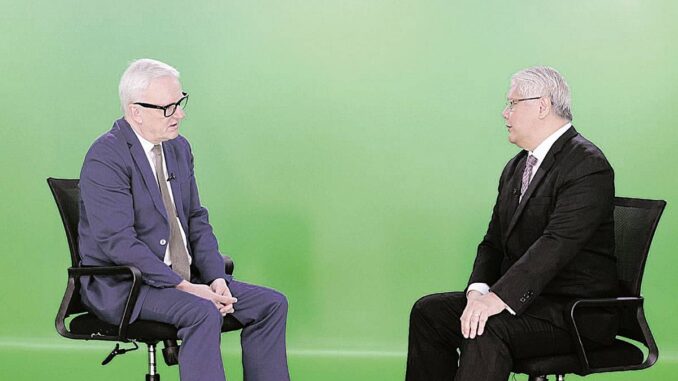
THE Philippines should consider creating workspaces that are ready for hybrid work as Philippine offshore gaming operators (POGOs) exit the country while new graduates who enter the workforce are increasing, said Lars Wittig, the country head of the International Workplace Group (IWG).
IWG owns and operates the Regus brand of workspace solutions, which include virtual offices, managed office spaces, and coworking areas.
Speaking at the new IBC public affairs show “The Chairman’s Report” with The Manila Times Chairman and Chief Executive Officer Dante Ang II, Wittig said he believes that more employees would want to work without a timesheet and a physical office, a trend which IWG saw even before it became vogue during the pandemic.
WITTIG’S WORKSPACE SOLUTIONS Lars Wittig (left), country manager of the International Workplace Group, talks about creating hybrid workspaces on the ‘Chairman’s Report’ on Oct. 18, 2024. Hosted by The Manila Times Chairman and CEO Dante Ang II, the public affairs program airs at 7 p.m. every Friday on IBC-13. PHOTO BY JOHN ORVEN VERDOTE

Lars Wittig, country manager of the International Workplace Group (left), talks about creating hybrid workspaces on the Chairman’s Report on Oct. 19, 2024. Hosted by The Manila Times Chairman and CEO Dante Ang II, the public affairs program airs at 7 p.m. every Friday on IBC-13. PHOTOS BY JOHN ORVEN VERDOTE

Lars Wittig, country manager of the International Workplace Group (left), talks about creating hybrid workspaces on the Chairman’s Report on Oct. 19, 2024. Hosted by The Manila Times Chairman and CEO Dante Ang II, the public affairs program airs at 7 p.m. every Friday on IBC-13. PHOTOS BY JOHN ORVEN VERDOTE

Lars Wittig, country manager of the International Workplace Group (left), talks about creating hybrid workspaces on the Chairman’s Report on Oct. 19, 2024. Hosted by The Manila Times Chairman and CEO Dante Ang II, the public affairs program airs at 7 p.m. every Friday on IBC-13. PHOTOS BY JOHN ORVEN VERDOTE

Lars Wittig, country manager of the International Workplace Group (left), talks about creating hybrid workspaces on the Chairman’s Report on Oct. 19, 2024. Hosted by The Manila Times Chairman and CEO Dante Ang II, the public affairs program airs at 7 p.m. every Friday on IBC-13. PHOTOS BY JOHN ORVEN VERDOTE

Lars Wittig, country manager of the International Workplace Group (left), talks about creating hybrid workspaces on the Chairman’s Report on Oct. 19, 2024. Hosted by The Manila Times Chairman and CEO Dante Ang II, the public affairs program airs at 7 p.m. every Friday on IBC-13. PHOTOS BY JOHN ORVEN VERDOTE
“Our founding CEO, Mark Dixon, was a very young entrepreneurial spirit; I believe he was selling hotdogs in Europe, and suddenly he needed his first office space, and that coincidentally was in Brussels when he realized how cumbersome it was to deal with the landlords… He just came up with the idea that there is an easier way to do it, so he created the first Regus center in the world,” Wittig said.
Wittig said that before the pandemic, flexible workspaces were growing, with 2 to 3 percent of all workspaces being flexible growing to 30 percent, but the coronavirus pandemic changed the way business owners thought about owning workspaces, calling it the “biggest workspace experiment in history.”
“It made everybody rethink how to work because now we were forced to work from home, and it is a productive way to work also,” Wittig said.
The pandemic also made organizations flatter, Wittig noted, where employees who were not invited to the corner office before the CEO are now on a Zoom call with them and coming in from their own living rooms.
He also said that with the hybrid setup, employees were instead measured by the results of their work, not by having managers look after them.
Wittig believes that the decision of the Philippine government to ban POGOs is laudable given the social costs associated with them, and with them leaving, there will be a lot of office space from these vacancies.
“As the vacancies are increasing, the only way you can cater to a different type of occupant is to embrace the demand of hybrid work. A lot of landlords are coming to us and explaining that they want to cover a different demand to the marketplace,” Wittig said.
Wittig said the Philippines has a big competitive advantage in getting foreign investments, with 2 million young Filipinos entering the workplace every year and a lower fertility rate than most Asian countries.
“With that growth rate, that pushes the cost of labor up, which becomes less competitive… There are so many investors who are convinced that the Philippines is in a golden era,” Wittig said.
He also said foreign investors should not look at the National Capital Region for possible investments, citing areas like Bohol, which has a new airport and increased frequencies for international flights.
“Bohol has so much to offer, and it benefits from the fact that Cebu is more saturated, as much as we are seeing it in Bacolod and Iloilo,” Wittig said.
Wittig hopes that the government will focus on allowing foreign companies to own telecommunications using the provisions of the amended Public Service Act, as well as loosening investment restrictions among local government units.
“The Chairman’s Report” airs every Friday at 7 p.m. on IBC-13, with streaming on IBC Digital’s Facebook and YouTube pages.





Be the first to comment